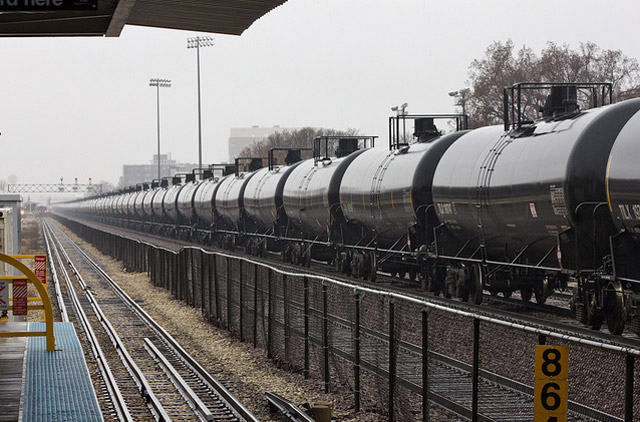Chicago: A 'Bomb Train' Kind Of Town?
By JoshMogerman in News on Mar 16, 2015 7:35PM
It took a few days to put the fires out at the edge of Galena, Illinois. While Chicagoans tend to think of the town at the edge of the Mississippi River as a great weekend getaway or antiquing jaunt, the extinguished inferno on the edge of town should have us paying more attention.
On March 5, a train pulling more than 100 cars full of crude oil hopped the tracks just outside the quiet eastern Illinois town. Twenty of the derailed cars caught fire, forcing the evacuation of everyone living within a mile. That was not a big deal, since the accident site was far enough from town that few people lived nearby.
But what if that was Chicago?
We are, after all, the nation’s rail hub. And oil trains move through the area regularly. Suburban mayors like Aurora's Tom Weisner have been speaking out and pushing to move the trains out of the region:
"There are an ever-increasing number of these derailments, almost once a week it seems lately. They are getting closer (to Chicago) all the time. The odds of something happening here have increased, and not in our favor."
Chicagoans see these hazardous material trains on a daily basis too. They pass within just a few yards of crowded Ping Tom Memorial Park in Chinatown. They pass through Bridgeport, next to the Archer L Stop and along the rail lines in Pilsen and Little Village. All throughout the near South Side, just a stone’s throw from the Loop. They can be seen on the Southeast Side, even occasionally parked along Lake Shore Drive near Bronzeville and Kenwood, near President Obama’s home.
A one-mile evacuation amidst those dense neighborhoods would be chaos.
With more than a million barrels of oil riding the rails daily in the United States, most coming out of the Bakken deposits in North Dakota where producers have chosen to use trains over pipelines to move their product, lots of these trains are coming our way. With increasing frequency, mishaps are happening. The horrific fireball disaster when a train rolled into the town of Lac Megantic in Quebec, Canada in 2013, incinerating 47 people, has been followed by a series of disasters including one last month in West Virginia. And of course, the BNSF train that burned in Galena, was in fact on its way to Chicago.
That all adds up to a new word in the American lexicon that reflects concern over these disasters: "bomb train."
The Feds have pushed for use of safer, more puncture resistant cars. But recent accidents, including the one in Galena, involved newer, reinforced cars. The real question would seem to be whether the trains tearing through rural areas of the country should also be traversing tracks through dense cities and suburbs too. The blaze in Galena would imply not.
